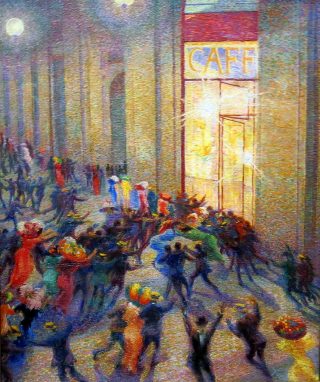On the evening of January 11, 1919, Tommaso Marinetti and some of his followers, lucky enough to get the invitation cards, manage to reach the stages of the Scala in Milan, where he expects the intervention of Leonida Bissolati, socialist reformist, exponent during the Great War of democratic interventionism.
Bissolati, a few days before, left the government because personally opposed to the claim to Italy of borders that could create new contrasts with the nationalities emerging from the disintegration of the Austro-Hungarian Empire, which was going Disastrously consuming in those weeks: he had thus joined Confidly in the idea of a League of Nations, following the proclamations of American President Woodrow Wilson.
Shortly after the beginning of his speech at La Scala, as Joseph A. Borgese tells,
“At a given moment, as if a fairy wand had kicked off, an infernal symphony began. Cries, squeals, whistles, grunts, all the possible verses imaginable in a cage of wild beasts, formed the dominant tone of that Symphony ” 1.
Bissolati arrives, despite the roar of the ruthless protest, about half of his speech: But, at this point, among the voices of the protestors clearly recognizes that to him well-known Benito Mussolini, who also has always manifested towards him a certain Consideration.
Then, again according to Borgese, Bissolati “turned his head towards the friends who were closer to him and said in a low voice: «That man does not!». From that moment he read his pages by formality, as if he read to himself. In the end there was no applause. The crowd, partly triumphant, partly disgusted but powerless, left the Theatre.” 2.
The rupture with moderate interventionism has thus been consumed: Mussolini continues on the way of enhancing the victory of fighters and producers, closer to the futuristic environments, nationalists, revolutionary trade unionists.
There is no doubt that he was taking the opportunity to mobilize ex-combatants back from the trenches, but there is also another aspect that today appears perhaps even more interesting. It recalls the same Borgese who, a few days before, himself, together with Luigi Albertini, senator and director of the Corriere della Sera, and Benito Mussolini, had found himself at the gala lunch offered in the ridotto, always at La Scala theater, in honoir of Woodrow Wilson, in triumphal visit to Italy. As Borgese says:
“When the other two [he and Albertini], on the basis of an evolutionary concept of history, had finished explaining to him how the Wilsonian plan of a League of Nations was logical, he [Mussolini], as a conclusion shook his shoulders several times, accompanying himself with a muzzle of the mouth” 3.
This image, quickly dashed by the intellectual, then a strong antifascist, is the revealing symptom of the formation in the mind of Mussolini of the impression that Wilson line was ultimately only an ideological one, basically instrumental.
Indeed, the conduct of the American President during the peace conference that the winners were about to open in Paris would prove that the famous fourteen points were for the same Wilson a mere chiffon de papier... At that point the image of the Italian “mutilated victory” would begin to find dramatic confirmation.


